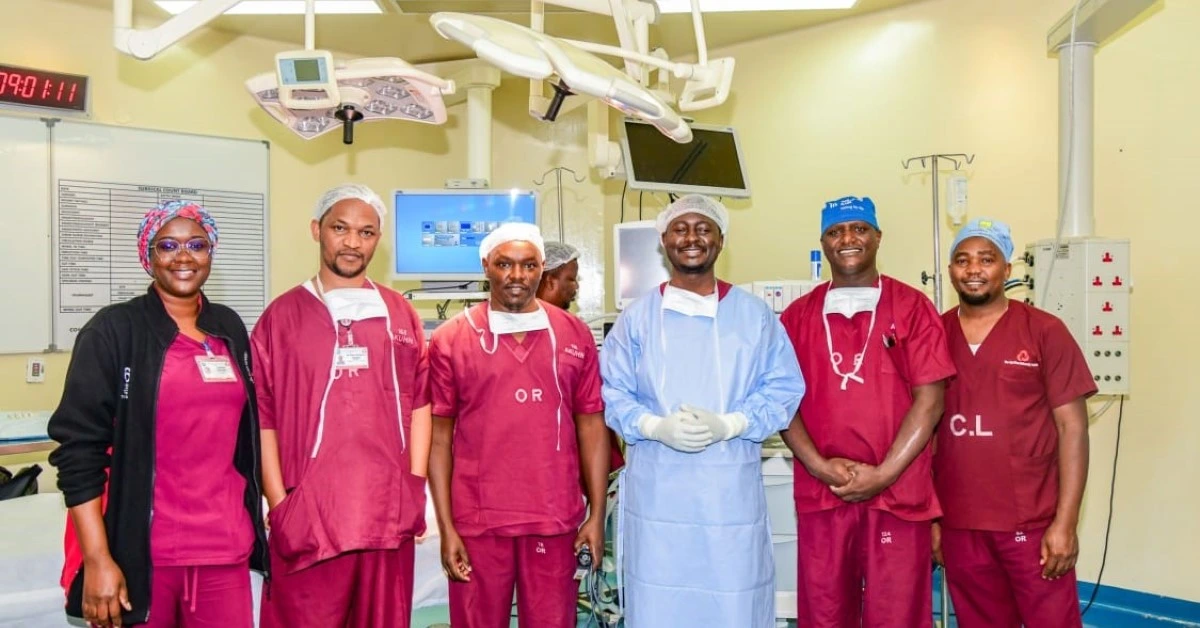
KENYA – Aga Khan University Hospital has made a significant advancement in the region by performing the first Vaginal Natural Orifice Transluminal Endoscopic Surgery (vNOTES), a minimally invasive procedure for treating various gynaecological conditions.
The breakthrough surgery, performed by lead surgeon Dr. Bob Achila, marks a new era in women’s healthcare, providing an alternative to traditional surgical methods.
vNOTES is a revolutionary technique that allows gynaecologists to access the uterus, fallopian tubes, and ovaries through the vaginal canal, using specialized instruments and a camera to guide the procedure without making any external incisions.
This approach offers a minimally invasive option for surgeries such as hysterectomy, operations on the fallopian tubes and ovaries, and pelvic organ prolapse.
“To perform vNOTES, a doctor must be specially trained in both minimally invasive surgery and the specific techniques required for this method,” the hospital noted in a statement, emphasizing the specialized expertise needed for the procedure.
Improving Women’s Healthcare in Africa
While vNOTES is a relatively new technique in Africa, it is gaining momentum as medical professionals across the continent develop proficiency.
Dr. Elkanah Omenge, Chair of the Department of Obstetrics and Gynaecology at Aga Khan University Hospital, lauded the surgery as a milestone that will greatly enhance women’s healthcare.
“This is a major medical breakthrough that will improve care for women locally and beyond,” he said.
“Our commitment to providing the best care drives us to continuously innovate, train, and update our skills to remain at the forefront of global healthcare practices.”
Patient benefits: Less pain, faster recovery
Dr. Bob Achila, who led the procedure, highlighted the numerous benefits of vNOTES, including no visible scarring, reduced postoperative pain, and a shorter hospital stay.
These advantages lead to quicker recovery times, allowing patients to return to their normal activities sooner.
“With vNOTES, patients experience less discomfort and a faster return to daily life compared to traditional surgery,” Dr. Achila noted.
Expansion of Aga Khan Hospital, Kisumu
Earlier this year, the Aga Khan Hospital, Kisumu underwent a significant expansion, improving healthcare access for 6.6 million people in Kenya’s Lake Region.
Transformed from a 70-bed facility into a 123-bed state-of-the-art hospital, the facility now boasts advanced services, including the region’s first Neonatal Intensive Care Unit (NICU) and a Sleep Lab for diagnosing sleep disorders.
The expansion, which represents an investment of nearly US $19 million, was made possible by a partnership with Agence Française de Développement (AFD) and the Kenyan government.
The upgraded facility offers a wide range of clinical specialties, from cardiology to oncology, making it a crucial healthcare provider for the region.
Princess Zahra Aga Khan, Chair of the Executive Committee of the Aga Khan Health Services, emphasized the hospital’s importance: “Aga Khan Hospital, Kisumu, plays a pivotal role in our mission to deliver critical health services to the Lake Region and beyond.
By being part of a broader, integrated network, we are ensuring that patients receive timely, fit-for-purpose care.”
Future Plans: Expanding Outreach and Healthcare Access
Aga Khan Hospital, Kisumu, plans to expand its reach even further by establishing 10 additional outreach health centers, adding to the existing network of 13 facilities.
This will strengthen the first line of care in Kisumu and beyond, providing comprehensive healthcare services from community-based care to specialist treatment at the hospital.
The project exemplifies the Aga Khan Development Network’s commitment to driving healthcare accessibility in Kenya.
Hélène N’Garnim-Ganga, Regional Director for Eastern Africa at AFD, stated, “This hospital extension not only improves health outcomes for Kenyans but also sets an example of how healthcare can adapt to climate change while maintaining high standards of care.”
XRP HEALTHCARE L.L.C | License Number: 2312867.01 | Dubai | © Copyright 2025 | All Rights Reserved